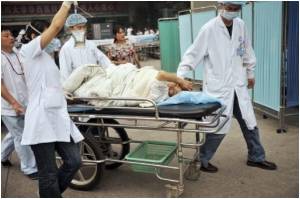
Aid groups can offer help but it is up to governments to protect the most vulnerable people, it said.
"Yet some seem to forget this when faced with the pressure of short-term economic decisions and austerity measures," Doctors of the World said in a report presented in Madrid.
"Vulnerable people need more protection in these times of crisis, not less."
The survey included 285 pregnant women seen in the aid group's clinics in Europe in 2013, of whom 65.9 percent had no access to antenatal care. In 70 percent of the cases seen, doctors decided the women were in need of urgent or semi-urgent care, it said.
In the same period, the group's clinics saw 1,703 children. At best only half had been vaccinated against tetanus, hepatitis B, measles and whooping cough, the survey said.
Advertisement
"This amounts to a denial of rights which goes against basic human rights, international conventions and respect for the fundamental principles for public health," it said.
Advertisement
More than half of the patients surveyed -- 9,002 -- were seen in French clinics, while another 3,430 were seen in Greece, 2,382 in Belgium and 1,047 in Britain.
Source-AFP















